
 Reading, Short And Deep #007
Reading, Short And Deep #007
Eric S. Rabkin and Jesse Willis discuss Beyond Lies The Wub by Philip K. Dick
Beyond Lies The Wub was first published in Planet Stories, July 1952.
Here’s a link to the PDF of the story.
Posted by Scott D. Danielson

 Reading, Short And Deep #007
Reading, Short And Deep #007
Eric S. Rabkin and Jesse Willis discuss Beyond Lies The Wub by Philip K. Dick
Beyond Lies The Wub was first published in Planet Stories, July 1952.
Here’s a link to the PDF of the story.
Posted by Scott D. Danielson

 The SFFaudio Podcast #334 – The Birth-Mark by Nathaniel Hawthorne; read by Fred Heimbaugh. This is an unabridged reading of the story (50 minutes) followed by a discussion of it. Participants in the discussion include Jesse and Fred.
The SFFaudio Podcast #334 – The Birth-Mark by Nathaniel Hawthorne; read by Fred Heimbaugh. This is an unabridged reading of the story (50 minutes) followed by a discussion of it. Participants in the discussion include Jesse and Fred.
Talked about on today’s show:
The Pioneer, March 1843, a Hawthorne Poe fest, contemporaries, The Scarlet Letter, a quote by Poe about Hawthorne, the CBS Radio Mystery Theater, well known?, why this story Fred?, he’s obsessed with sin, sociopaths, trigger warnings, neurosis, shame, luck, shaped by sin, a mark upon the family, subconscious Freudian messages, Commentary Magazine, Why College Kids Are Avoiding the Study of Literature by Gary Saul Morson, textual density, vocab, Lovecraft poems, Fungi From Yuggoth poems, harbours, kids are now shuttled between school the home and the mall, ranting against Hawthorne, The House Of The Seven Gables, revolutions in 20th century literature, Ernest Hemingway, the show don’t tell revolution, Hawthorne is the telling-est teller who ever telled, the right attitude toward sin, the two facedness of people, Hawthorne is attacking late stage decadent Puritanism, a homosexual vibe, what is the lesson?, science reaches too far?, Gothic horror, the evil wizard or the mad scientist, science as the channel to unlimited power, elixirs, potions, not even futuristic, Georgiana, Aminadab?, where is this story set?, Aylmer’s castle, Aylmer’s wealth, a compartmentalized life, from the third person POV, the host narration, obsession, the left side, the sinister side, she’s been marked, in the dream, chemical means, pre-Darwin, “I’ve got these old books”, Mary Shelley’s Frankenstein, a natural philosopher, science vs. alchemy vs. magic, Isaac Newton, almost as if he was Ben Franklin, electricity, many suitors, Aylmer’s wooing, is Aylmer gaslighting Georgiana?, she’s reading, a Medieval heroine, a character of of Greek mythology, is a sex-change story?, is this a boob-job story?, envy, the tips of two small fingers, she’s compared to a marble statue, small pox scars, Marilyn Monroe‘s beauty mark, does positioning matter?, Supernatural Horror And Literature by H.P. Lovecraft, a meditation on obsession, many uninteresting analysis, so little action, beyond the sexual interpretation, Hawthorne doesn’t seem all that prudish, how far can you go in purist of perfection in a fallen world, a mark of original sin, wanting knowledge (of good and evil?), the sin of disobedience, Frankenstein and Aylmer are reading the same books, the process of creating a man in Frankenstein, the lightning bolt, Luigi Galvani, grave-robbing, Paracelsus, the gold thing is your way of getting funding, when writing a grant…, this might lead to a cure for cancer(!), alchemy as a religion, The Cask Of Amontillado, Eric S. Rabkin, “the niter, it grows”, Montresor or Fortunato, niter, growing human shaped things inside of bottles, poisons, psychology and the occult, the difference between alchemy and science is openness, the Royal Society, Harry Potter’s school, there have to be muggles, magically oblivious, J.K. Rowling, natural greed, the ethic of sharing knowledge, France’s version of the Royal Society, like the obsession with “open source” or the “public domain”, The Oval Portrait by Edgar Allan Poe, sooo lifelike, sooo beautifully painted, Gothic horror, the evil mad scientist is destroyed by the power he unleashes, The Portrait Of Dorian Gray by Oscar Wilde, the ending, what is Hawthorne saying?, was Aylmer’s attempt doomed from the beginning?, Jesse’s mom, one of the most important powers of a teacher, she has “THE VOICE”, Muad’dib (Paul Atredies), Steve Jobs’ reality distortion field, a profound revelation, philosophy and critical thinking, vitamins are bullshit, fish oil woke Fred’s brain, North America has the world’s most expensive urine, religion wants you to take it on authority, bronze age holy texts, religion as book club where you only ever read one book (or just listen to a guy who did), cynicism or wisdom, loyalty to the organized religion of your family, inherited religions, fundamentalist belief systems, the narcissism of small differences, splintering, revolting revolutionaries, purity of doctrine, young earth creationists, Catholicism as an almost ethnicity (an identity), Hawthorne as a stopgap between H.G. Wells and Mary Shelley, the murky origins of Science Fiction, Dante, Lucifer frozen in the ice, a Gothic ghost story, Frankenstein’s obsession is with defeating death, too in love with science, Hawthorne’s message is like: “don’t drink too much”, Greek symposia, what really happened at a Greek symposium, “write drunk and edit sober”, The Odyssey, mixing water with wine, getting plastered is a sign on unmanning, the Greek obsession was with finding the moderation between too little and too much, what was Hephzibah’s sin?, her sin is being too worried about sin, “you will eat blood”, public shaming is a little much, be moderate with your casting of sin, John Wesley, a healthy functioning society, wealth corruption, falling into decadence, the protestant work ethic is kicking-in, Guggenheim, ransoming the grandchild, leaving it all to art, Andrew Carnegie, John D. Rockefeller, Fred’s all time favourite Science Fiction novel: The Diamond Age by Neal Stephenson, how do we raise the next generation?, a supercharged Kindle, matter compilers, Star Trek‘s replicator, eating green sludge, window panes made out of pure diamond, handmade hipsters, how you raise the next generation in a wealthy society, we are unimaginably wealthy, are Japan’s young people uninterested in sex?, Richard Dawkins on Twitter, The Last Question by Isaac Asimov, Gothic-y, Science-y, Microcosmic God by Theodore Sturgeon, a great inventor, Neoterics, he’s stealing their ideas, the ultimate mad scientist story, following in the tradition, somatoypes, ectomorph (Aylmer), mesomorph (Aminidab), endomorph (Jesse), it’s a scam!, Hillary Clinton, the Ronald Reagans of the world, this is astrology, people think that once you’ve got a word for something you understand it, wearing the mask long enough…, IQ tests, quantification, any time we think we understand the most complex thing in the universe…, there really is a subconscious, tweeting dreams, psychology, the book club with only one book in it, The Great Courses (The Teaching Company), Eric S. Rabkin, survey courses, kooky specializations, the best way to learn, the perennial student, taught not to learn, philosophy of art, credentialism, Jesse can guess the exact words in a student’s vocabulary, guess your weight or age, how Jesse gets work, gaming credentialism, no high school diploma, a contempt for institutionalized learning, a play-by-the-rules personality, grade inflation, what did Mussolini do?, intimidation vs. cultivation, give the students the experience of reading, reading as a meeting of minds, defending a dissertation, essays, we’re obsessed with essays (for the wrong reason), ohhh spoilers!, the big problem with almost any media, “I don’t want to spoil it for you.”, testing is easier, a kind of objectivity, don’t blame the actors for shitty Hollywood movies, status is society, education as the cultivation of minds, there aren’t enough people who are willing to rebel!


Posted by Jesse Willis

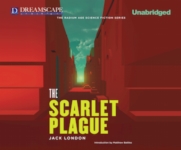 The Scarlet Plague
The Scarlet Plague
By Jack London; Read by Drew Ariana
Approx. 2 Hours 13 Minutes [UNABRIDGED]
Publisher: Dreamscape Audio
Published: August 20, 2013
Themes: / Science Fiction / San Francisco / Plague / Post-Apocalypse / Disease / Philosophy / Politics / Class Conflict /
The year is 2013 and plague has struck. Not a wannabe killer like SARS or the Spanish flu, but a tsunami type devastation that swallows every living thing, check that, every person, in its path. Its nickname is the red death because at its arrival the first thing that happens to the infected person is they start sporting a red face – like a beacon for everyone else around them to – RUN. The next thing that happens is they die. Well a little more goes on in between, numb feet, numb hands, a heart so numb it stops. All within an hour, or a few hours if the person is lucky/unlucky enough to have it drag out that long. Then for fun what’s left of the numbed, red faced, ex-person, immediately starts decomposing, falling apart before the eyes of anyone still around to witness it, practically shooting decomposing germs into the air like a plant shooting its spores. There are two classes of people, the ultra rich and everyone else. As the ultra rich jump into their airships to get as far away as possible, they just carry death with them – first class. Everyone else simply falls down and dies where they are. The devastation’s full name is Scarlet Plague. Sixty years into the future when the very few last contenders of what was once the mighty human race hear tell about it, they can’t even decipher what scarlet means because language (like life) has degraded to the point of only holding on to what’s necessary. Scarlet is red. Counting only needs to go as high a ten. The squiggles on money and books are meaningless, but that’s of no consequence because neither books nor money are in use anyway. Apologies, I’m getting ahead of myself. About 160 years ahead.
The Scarlet Plague by Jack London, published in 1912 is about the plague that will strike 100 years from his time, told from a perspective 60 years hence by the last man alive who’s ever seen an airship or read a book. 2013, a hundred years into the future for Jack London, is today and yesterday, this week. Hearing this story now, is like what it was to read (or re-read) 1984 in 1984. Sort of surreal. Interestingly 1984 is a year that was mentioned in the story of the plague. Did George Orwell choose that year with a tip of his hat? Probably. I’ve heard George was a fan.
Back to Jack. What did he get right? What did he miss? Commercial airships? Instant wireless communication? Check, check. About 8 billion people planet wide? Check. The ultra rich and everyone else, hmmm, not that far off the mark, probably pretty close considering he was most likely exaggerating a little to make a point. The work didn’t actually feel like science fiction, it felt contemporary, the section that describes this part of the century anyway. Like his projection to 2073 started from here, not from a century ago. Because the today part of the story is so right, it makes the rest of the story worse.
Not worse as in it’s a bad story. It’s an excellent, superbly imagined, tangible story. Worse in regards to how Mr. London judged the human condition. 60 years from now, 160 years from when the book was written, James Howard Smith or Grandsir, is telling his three grandsons the story of the plague. A story that was in great demand 20 or 30 years before, is quickly becoming lost – now of passing interest to two of the boys, and of real interest to only one. For one thing Grandsir’s sentences are way too complicated, especially when he goes off into his memories and starts speaking as he used to do when he was professor of English literature at Stanford. Speech has become staccato and minimalist, the niceties of language having died off with everyone that had time for that sort of thing. The other problem is the things Grandsir talks about make no sense to the boys. Cities, cars travelling by air, exchanging things with money, wasting time with written markings, all of it is so outside of what the boys know it might as well be make believe. The ramblings of a deranged, lost, old mind. With an estimated world population of less than 500, life has become a question of survival. If you want to eat then you have to go out and kill yourself some dinner. Grandsir calls his grandsons savages. When he was a boy (one of his constant refrains) there were those who gathered food and those who ordered its gathering. His progeny has been reduced to food gatherers. Interestingly Grandsir’s still got them gathering food for him. Old habits die hard I guess.
So why was this professor of classical literature spared to help re-forge humanity? No reason. One in every few million just didn’t get red faced. Maybe death momentarily blinked as it passed them by or got distracted by the particularly amusing scene of the mountains of bodies piling up at its feet. A couple of feeble minded, the very richest most splendid woman in America, a violent, vile, wife beating chauffer who made himself her husband, our friend the professor – just a few random cards in the deck. Life’s like that. You build your magnificent cities, you spend your time creating art and pondering the great questions, and life responds by carelessly wiping itself out. Careless in that it doesn’t quite finish the job. But no matter, because life will make its way forward again.
And now we come to the worst part of the story. It’s not the plague and what happens in the aftermath. The author makes it clear that ultimately, in the long run, humanity will rally back. They’ll rebuild and create again. The worst part is what Mr. Jack London sees after that.
Drew Ariana who read the story in this recording did a good job. My only issue was the character voice he assumed for Grandsir. I didn’t have a problem with the voice, the problem was, so much of the story was told using this voice it became a little distracting. Otherwise, an easy, pleasant listen.
By the end of the book, awash in dystopia, I was seeing a little red. Too delightful not to share, here’s a little red (or Scarlet) for you. “All man’s toil upon the planet was just so much foam. He domesticated the serviceable animals, destroyed the hostile ones, and cleared the land of its hostile vegetation and then he passed and the primordial flood of hostile life rolled back again, sweeping his handy work away.”
Posted by Maissa Bessada

 The SFFaudio Podcast #234 – Who Knows? by Guy de Maupassant; read by Mark Turetsky. This is a complete and unabridged reading of the story (39 minutes) followed by a discussion of it. Participants in the discussion include Jesse, Mark Turetsky, and Professor Chris Coski of Ohio University.
The SFFaudio Podcast #234 – Who Knows? by Guy de Maupassant; read by Mark Turetsky. This is a complete and unabridged reading of the story (39 minutes) followed by a discussion of it. Participants in the discussion include Jesse, Mark Turetsky, and Professor Chris Coski of Ohio University.
Talked about on today’s show:
One of the last Guy de Maupassant stories, fantasy podcasts, what genre is this story?, the mysterious, the macabre, the morbid, do we buy the narrator’s story?, Am I Insane? by Guy de Maupassant, the events that happen are insane, a horror story?, a satire of Gothic horror, it is a ridiculous premise, a mental institution, is he lying?, is he deluded?, the servants, very thorough thieves, the title, Maupassant is intentionally ambiguous, there’s always a grain of the opposite, a syphilitic brain crafts a masterful short story, is it a true-ish story?, Maupassant was kind of a loner, boating among other things, Maupassant liked his solitude, touring all the European cities, THE SIGN OF DEATH PRECEDES STRANGE EVENTS, “several hours”, if the furniture is taking the place of other people…, affection for objects, The Golden Braid (aka The Tress Of Hair), falling in love with an object, the writing desk and its contents, where did the writing desk go?, his letters his papers, his personal history is now gone, deracinate , visiting new places, the history of his heart, the photographs, his emotional life, the furniture is the mental faculties, the house is him,
“Then I suddenly discerned, on the threshold of my door, an armchair, my large reading easy-chair, which set off waddling [LIKE A DUCK]. It went away through my garden. Others followed it, those of my drawing-room, then my sofas, dragging themselves along like [CROCODILES] on their short paws; then all my chairs, bounding like [GOATS], and the little foot-stools, hopping like [RABBITS].”
his desk is like a wife who’s trying to run away, the repeated refrains, “imagine my feelings”, you stop being the reader and become a participant, the revolver, marauders, the doors are alive too, Rouen, his arms were there, gun nuts, the presentiments, the river Robec, the black nauseous waters, the second hotel scene mirrors the first, is the hotel an asylum, you found your mental faculties, he checks himself in (to the hotel and the asylum), are you a private gentleman?, is the asylum is a prison?, the fat bald little yellow bearded man from Rouen with a head like a moon, grammatically it doesn’t make sense, ambiguity, THE MOON, the witch’s sabbath crescent, the play “beautiful music and fairy life drama”, he’s had a spell cast on him, “a serious accident would certainly take place”, a paralytic stroke, the sound from outside his body, a humming, trains passing, clocks, marching multitudes, “the big one”, the crescendo, “Signad” in Swedish means “designed”, Sigurd, the ring cycle, dwarves, fantasy and reality mixing, were the cops playing along?, “this house communicates with it’s neighbors”, very weird, Jesse’s tweeted dream explanation: “Dreamt an explanation for WHO KNOWS? By Guy de Maupassant – the furniture was deleted, & their dissolution was confabulated.”, not a psychological interpretation, an ontological interpretation, accidentally deleting something, SimCity, ctrl-z, not a useful miracle, an incompetent higher power, “My god, my god”, “Merciful heaven”, no grudge against, Who knows?, God knows!, a murderous schoolteacher, Revenge by Guy de Maupassant, a higher power that deletes, the short story is the only form that can be perfect, there’s something perfect, any lacuna, “a missing section of text”, the oxymoron, rude gentleness, an unbalanced situation, the insane sanity or the sane insanity, the widow Bidoin,
“He ordinarily passes his evenings at the house of a female neighbor, who is also a furniture broker, a queer sort of sorceress, the widow Bidoin”
is she married to the bald man, that Disney movie, maybe it isn’t a perfect short story, etymological searches, the tour of Africa, Sicily, Normandy, “where there hover no vague hauntings”, the missing night, a different sort of desert, Fear by Guy de Maupassant, “I had a presentiment in Africa”, “the sun dissipates it like a fog”, fear vs. panic, the spiritual gnawing of northern cultures, The Inn by Guy de Maupassant, H.P. Lovecraft, “God is dead but he never really was alive. The universe is real but we’re alone in it. Looking up at the starry night we are pointless, alone, with nothingness behind us, nothingness ahead of us, and its horrible.” he goes crazy because he’s alone, in the tumult of the crowd (with it’s light pollution), “there’s a shop for that down the street”, very very very small and unimportant, Lovecraft made it a monster, Eric S. Rabkin, light as the symbol for knowledge, inside the interesting chest cavity, a cosmic vastness and emptiness in which we are lost, solitude, Rouen, Rotomagus (round market or round plain) – but the word magus, J.R.R. Tolkien’s dwarves, great craftsmen, is the man from Roen really God?, yesterday I was in a private asylum, three months, a descent into madness, is there no lacuna in the inflexible sequence of his observations, a lacuna in which the end took place.
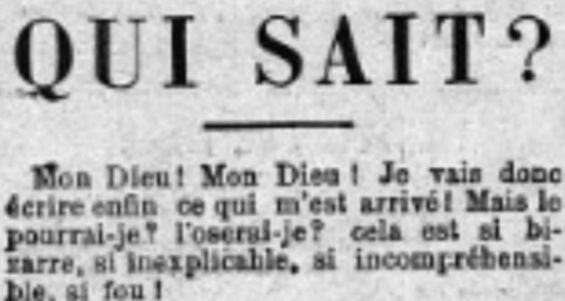
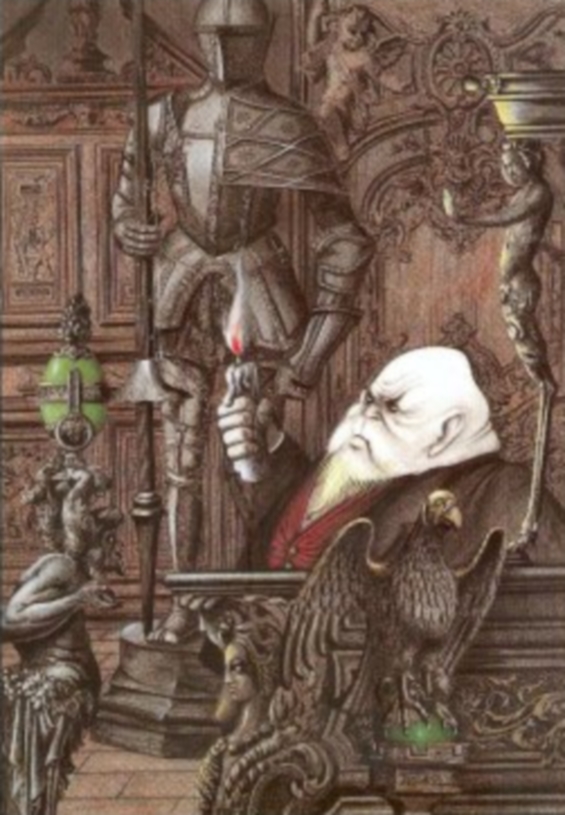
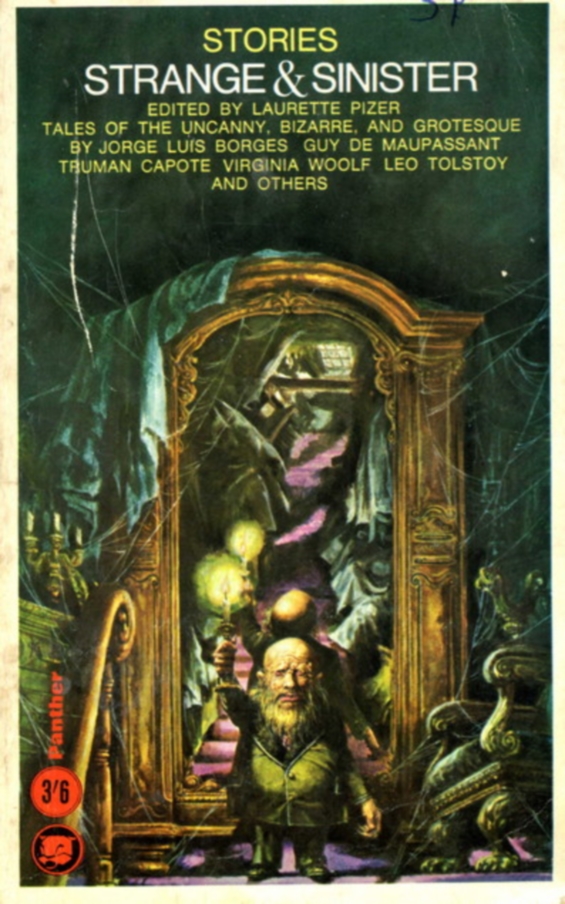
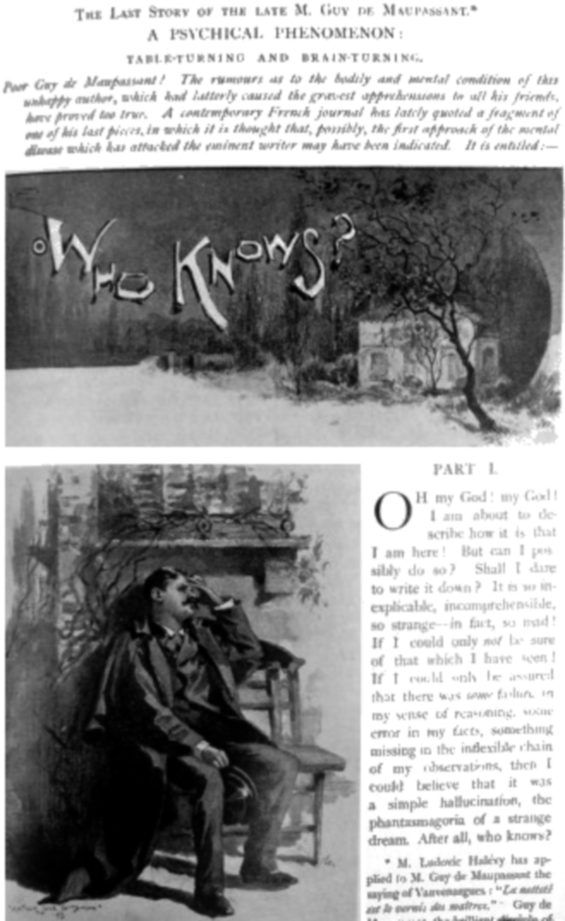
Posted by Jesse Willis

 The SFFaudio Podcast #228 – Jesse and Jenny talk about the Last And First Men by Olaf Stapledon.
The SFFaudio Podcast #228 – Jesse and Jenny talk about the Last And First Men by Olaf Stapledon.
Talked about on today’s show:
the near and far future, not a novel, an imagined planetary history, the scope, Penguin Books, philosophy, the introduction, The Iron Heel by Jack London, a future history, human civilizations, two thousand million years (two billion years), universes => galaxy, man is a small part of the universe, Starmaker by Olaf Stapledon, Doctor Who, 2001: A Space Odyssey, what the plot would look like if there was one, the eighteen periods of man, evolution and construction, it’s set in 1930, is there ever an end to humanity?, Last Men In London by Olaf Stapledon, Last And First Men was popular in its day, Stapledon served in the ambulance service in WWI, plotlessness, period themes, the flying theme, the depletion of fossil fuels, The Mote In God’s Eye by Larry Niven and Jerry Pournelle, Venus, Mars, Neptune, the Martians, the Venusians, the genocide on Venus, Luke Burrage (the Science Fiction Book Review Podcast), racism, a Science Fiction mythology, the poetic musical ending, deep time, to the end of the Earth and beyond, Stapledon as an historian, civilizations always fall, there’s no one thing that ends civilizations, humanity as a symphony, the returns to savagery, establishing the pattern, Arthur C. Clarke, The House On The Borderlands by William Hope Hodgson, The Night Lands, The Time Machine by H.G. Wells, H.P. Lovecraft and cosmicism, the Wikipedia entry for Last And First Men, Fritz Leiber, Forrest Ackerman, scientificion, matchless poignancy, S. Fowler Wright, Lovecraft’s love of the stars (astronomy), one of the species of man is a monkey, another a rabbit, no jokes but perhaps humour, a cosmic joke, monkeys have made human their slaves, Planet Of The Apes, an ability to hear at the subatomic level, intelligence, a fourteen foot brain supported by ferroconcrete, obsession with gold, obsession with diamonds, pulping people, it’s written like a history textbook or essays, the Patagonia explosion, the upstart volcanoes, Earth Abides by George R. Stewart, The Scarlet Plague by Jack London, chiseling knowledge into granite, Olaf loved coming up with different sexual relationships, the 20 year pregnancy, suicide, euthanasia, an unparalleled imagination, groupthink, telepathy, oversimplification, we must press on, the baboon-like submen, the seal-like Submen, the divergence of man into other ecological niches, the number of ants in New York, ecosystems, nuclear weapons, robots are missing, where is the robot man?, the over-emphasis on fossil fuels as the only source of energy, if you could see us now, post-humans, ultimately a love letter to humanity, not aww but awwww!, Starmaker as a masterpiece, Sirius, uplifting a dog, a fantasy of love and discord, dog existentialism, who am I and where is my bone?, Olaf Stapledon in the PUBLIC DOMAIN, influential vs. famous, a very different read.


Posted by Jesse Willis

 The SFFaudio Podcast #224 – Exhibit Piece by Philip K. Dick; read by Mark Turetsky. This is a complete and unabridged reading of the story (40 minutes) followed by a discussion of it. Participants in the discussion include Jesse, Jenny, Maissa Bessada, and Mark Turetsky.
The SFFaudio Podcast #224 – Exhibit Piece by Philip K. Dick; read by Mark Turetsky. This is a complete and unabridged reading of the story (40 minutes) followed by a discussion of it. Participants in the discussion include Jesse, Jenny, Maissa Bessada, and Mark Turetsky.
Exhibit Piece was first published in the August 1954 issue of If: Worlds Of Science Fiction.
Talked about on today’s show:
“Hi, I’m the main character”, a pocket universe, a time portal, is the cold war a 22nd century office feud?, looking back at the 1950s, 1950s nostalgia in the 1950s, middle class white guy, cobalt bombs, the boogeyman, global warming?, Jesse needs to listen to the fear propaganda, a historical perspective, how to build a cobalt bomb, what was he doing in there?, was Miller herded into the 1950s world?, the authority figures, the TV, the newspaper, the dreamed are secure until the dreamer wakes?, Star Trek, Barbara Adams, talking to her hair?, Trekkies, is Miller delusional?, a crack in time, a nested world, living inside a museum exhibit with a confabulated wife and children, Berkeley, California, San Francisco, New York -> N’York, public transportation (the bus) -> pubtrans, the Wikipedia entry for Exhibit Piece, citation needed, does the entire story happen in the 1950s?, did Miller have a psychotic break after reading the newspaper?, TOTAL WORLD DESTRUCTION AHEAD, the missing newspaper, Philip K. Dick’s old house, dog food for dinner, the world of the neighborhood,a mistake the Oakland Daily, I didn’t get up until noon anyway, the newspaper as the binding point, is the psychiatrist right?, the names, Grunberg, Fleming, Carnap, the philosopher Rudolph Carnap, logical positivism, the slippage of words, natural deductive logic, death panels, a priori, philosophy, Newspeak in reverse, double plus good, “Dig me?”, the Eisenhower administration, Jazz cats, the 22nd century is pretty awful, the time when men were still men, Military–industrial complex, Eisenhower’s field rank, misplaced power, a golden age, the greying of the world, even the robot thinks he’s weird, how smokeable is two centuries old tobacco?, is the future the delusion?, was anti-hist a term at the time?, gorning!, transformed language, Russian River, incongruous authority figures, the highest ranking official in the world directorate doesn’t have anything better to do, delusions of grandeur, maybe history is just that important to them, Hampton Court Palace, who is the museum for?, what a weirdo, the business suit as a uniform, similar Philip K. Dick short stories, Upon The Dull Earth by Philip K. Dick, resurrection, The Commuter by Philip K. Dick, only the reader can see it, how are the worlds linked?, the version where Miller is crazy, Second Life, computer generate realities, World Of Warcraft grinding day and night, sorta-real gold, there’s no distinguishment between realities, Breakfast At Twilight by Philip K. Dick, time travel, the Cold War, idealized suburban lifestyle, a fleet of Russian robots (drones), fear of nuclear war 1950s – 1980s, Russian spy stories, fear of AIDS, AIDS education in Kindergarten!, blast radii, things are going to be great, Mark Turetsky has been narrating audiobooks since 2009, nerdy kids books, Pi In The Sky by Wendy Mass, a Recorded Books Book, Mark’s like a Kirby Heybourne type, the zombie books, Little Brother by Cory Doctorow, Cloud Atlas, Gone Girl, Ace Galaksi is a Canadian comedic audio drama miniseries.
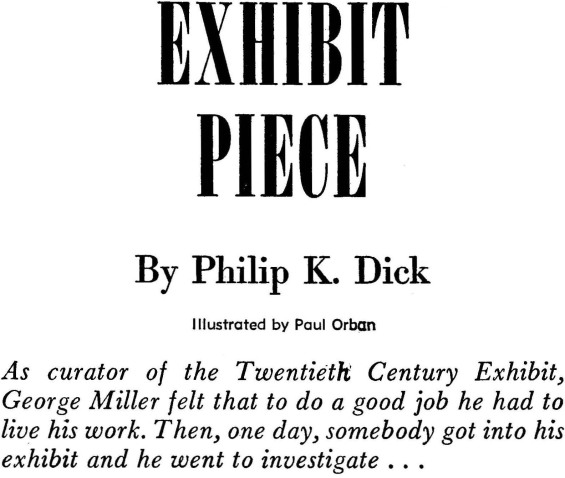
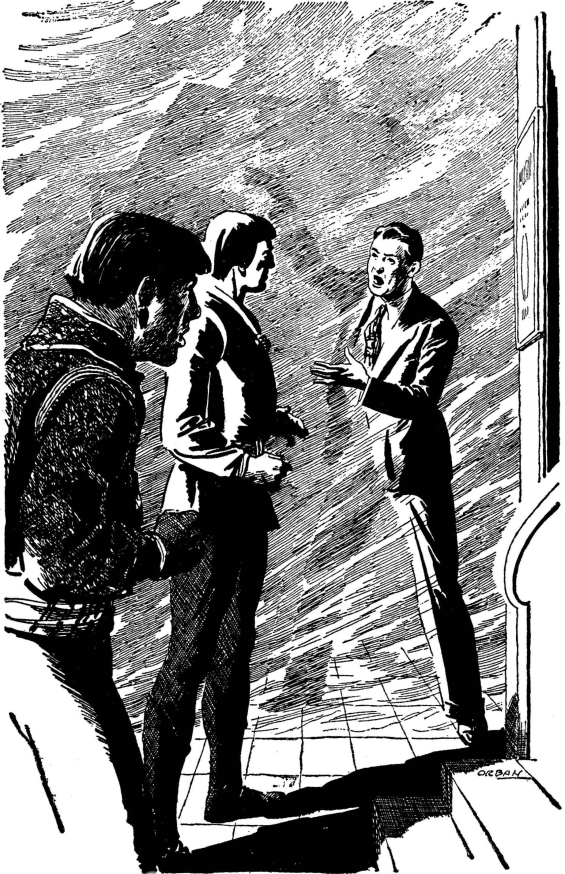
Posted by Jesse Willis